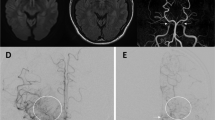Abstract
New-generation tyrosine kinase inhibitors (TKIs), nilotinib and ponatinib, for chronic myelogenous leukemia (CML) have been reported to cause symptomatic cerebral ischemia. Herein, we report two patients with asymptomatic cerebral artery stenosis associated with these TKIs, as a previously unreported finding. Both patients were in their 40 s and administered new-generation TKIs without vascular risk factors. New-generation TKIs for CML can cause major cerebrovascular stenosis without any symptoms. Examining the neck and intracranial arteries using magnetic resonance angiography and carotid ultrasonography may prevent future cerebral infarctions associated with these TKIs.



Similar content being viewed by others
References
Chai-Adisaksopha C, Lam W, Hillis C (2016) Major arterial events in patients with chronic myeloid leukemia treated with tyrosine kinase inhibitors: a meta-analysis. Leuk Lymphoma 57:1300–1310
Chen CJ, Sorace BJ, Shakeri A, Park MS, Southerland AM, Worrall BB, Kalani MYS (2018) Tyrosine kinase inhibitor induced rapidly progressive vasculopathy after intracranial stent placement. J Neurointerv Surg 10:e28
Coon EA, Zalewski NL, Hoffman EM, Tefferi A, Flemming KD (2013) Nilotinib treatment-associated cerebrovascular disease and stroke. Am J Hematol 88:534–535
Dahlén T, Edgren G, Lambe M, Höglund M, Björkholm M, Sandin F, Själander A, Richter J, Olsson-Strömberg U, Ohm L, Bäck M, Stenke L, Swedish CML Group and the Swedish CML Register Group (2016) Cardiovascular events associated with use of tyrosine kinase inhibitors in chronic myeloid leukemia: a population-based cohort study. Ann Intern Med 165(161):166
Damrongwatanasuk R, Fradley MG (2017) Cardiovascular complications of targeted therapies for chronic myeloid leukemia. Curr Treat Options Cardiovasc Med 19:24
Douxfils J, Haguet H, Mullier F, Chatelain C, Graux C, Dogné JM (2016) Association between bcr-abl tyrosine kinase inhibitors for chronic myeloid leukemia and cardiovascular events, major molecular response, and overall survival: a systematic review and meta-analysis. JAMA Oncol 2:625–632
Gómez-Galván JB, Borrego S, Tovar N, Llull L (2017) Nilotinib as a risk factor for ischaemic stroke: a series of three cases. Neurologia 32:411–413
Manouchehri A, Kanu E, Mauro MJ, Aday AW, Lindner JR, Moslehi J (2020) Tyrosine kinase inhibitors in leukemia and cardiovascular events: from mechanism to patient care. Arterioscler Thromb Vasc Biol 40:301–308
Moslehi JJ, Deininger M (2015) Tyrosine kinase inhibitor-associated cardiovascular toxicity in chronic myeloid leukemia. J Clin Oncol 33:4210–4218
Ozaki T, Nakamura H, Izutsu N, Masaie H, Ishikawa J, Kinoshita M (2017) Intracranial stenting for nilotinib treatment-associated cerebrovascular stenosis in chronic myeloid leukemia. Interv Neuroradiol 23:527–530
Suzuki K, Yamamoto J, Kakeda S, Takamatsu S, Miyaoka R, Kitagawa T, Saito T, Nakano Y, Nishizawa S (2019) Vessel wall magnetic resonance imaging findings and surgical treatment in nilotinib-associated cerebrovascular disease: a case report. Mol Clin Oncol 10:239–243
Valent P, Hadzijusufovic E, Schernthaner GH, Wolf D, Rea D, le Coutre P (2015) Vascular safety issues in CML patients treated with BCR/ABL1 kinase inhibitors. Blood 125:901–906
Author information
Authors and Affiliations
Corresponding author
Ethics declarations
Conflict of interest
The authors declare no competing interests.
Additional information
Comments
This is a short case report that suggests a linkage between new-generation tyrosine kinase inhibitors (TKIs), specifically nilotinib and ponatinib (used for chronic myelogenous leukemia). The authors report two patients with newly developed asymptomatic cerebral artery stenosis that they feel is perhaps associated with administration of these TKIs, which would be a previously unreported finding. Unfortunately for case #1 there is no pre-nilotinib cerebrovascular imaging data available, which weakens the hypothesis testing. Case #2 does appear to have pre- and post- drug imaging, which materially strengthens consideration of their hypothesis. The potential association is clearly worthy of further study.
Christopher Miranda Loftus
PA, USA
Publisher's note
Springer Nature remains neutral with regard to jurisdictional claims in published maps and institutional affiliations.
This article is part of the Topical Collection on Vascular Neurosurgery—Other
All authors confirm that this manuscript does not contain previously published materials and is not under consideration for publication elsewhere
Rights and permissions
About this article
Cite this article
Hirayama, A., Sorimachi, T., Yokota, K. et al. New-generation tyrosine kinase inhibitor-associated asymptomatic cerebrovascular stenosis: two illustrative cases. Acta Neurochir 164, 1623–1626 (2022). https://doi.org/10.1007/s00701-021-05043-3
Received:
Accepted:
Published:
Issue Date:
DOI: https://doi.org/10.1007/s00701-021-05043-3




